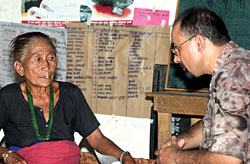|
|
With more than half of Nepal's doctors practicing in Kathmandu Valley, it\'s easy to see why rural Nepal has the lowest density of doctors per 100,000 population in the world.
But if we had more doctors like Guna Raj Lohani, we wouldn't have a health crisis in this country.
After graduating from Russia, Guna Raj (above right) returned to Nepal determined to make a difference in the lives of poor Nepalis. He has spent the last 12 years in Nepal's remote and conflict-ridden districts: Gulmi, Jajarkot, Khotang, and now Panchthar, where he is the district health officer.
Lohani, 44, is a doctor but in places like Panchthar he has to be an all-rounder. In nearly two-and- a-half years he has had to deal with emergencies and perform over 150 procedures such as appendectomy, hernia, laparectomy and a large number of caesarian sections.
Despite the conflict, he has managed to walk to 40 of the district's 41 VDCs. "The conflict is a very convenient excuse for people who do not want to work," says the doctor, stroking his goatee, "I treat patients on both sides of the conflict. They are Nepalis, and that's all that matters."
Guna Raj takes pride in Panchthar's improvements in maternal health. Under his guidance, the district hospital-which is a referral centre for neighbouring Tehrathum and Taplejung districts-has upgraded its facilities and the number of women coming for deliveries in the past year has doubled. This is mainly because there is now a 'real' doctor available.
One of the major health problems in rural Nepal is prolapse of the uterus. Under the hot tin roof of the makeshift sub-health post in a bombed out building in Subhang VDC, Guna Raj examines an assembly line of patients. In between examinations, he tells us that encouraging more doctors to stay in district hospitals would dramatically improve health care in rural Nepal. He has started an innovative program to take interns from Dharan's BP Koirala Medical Hospital to Panchthar.
Says Guna Raj: "We can replicate what we have done in Panchthar all over the country. It just needs more commitment."
Srinkhala Sharma



